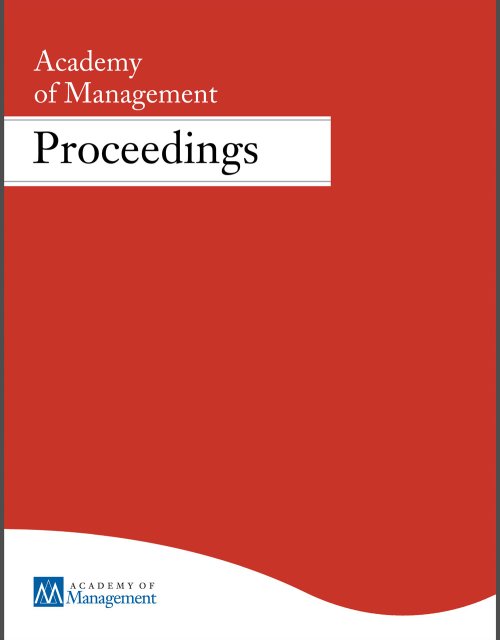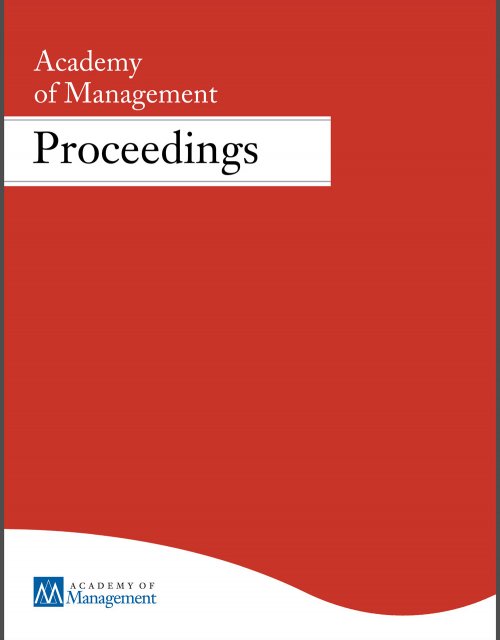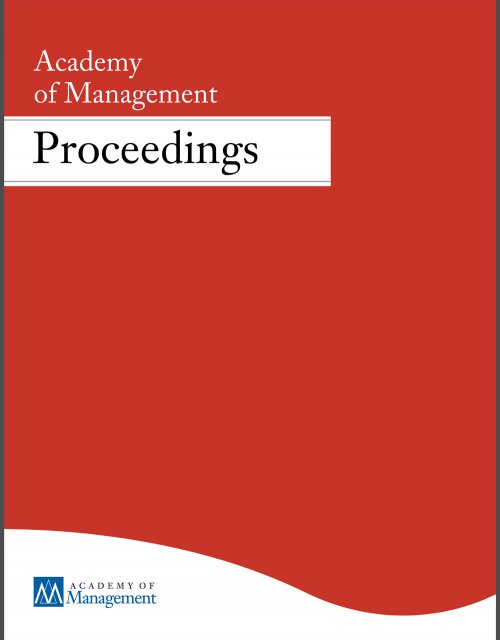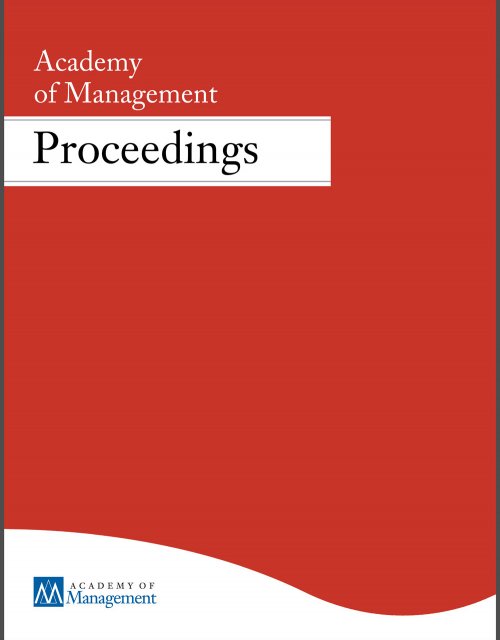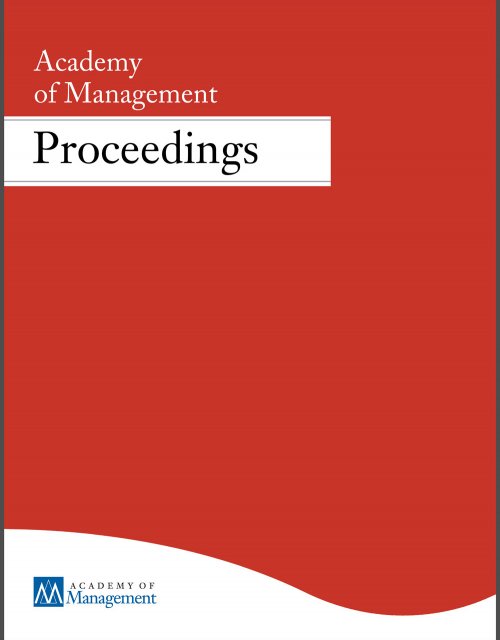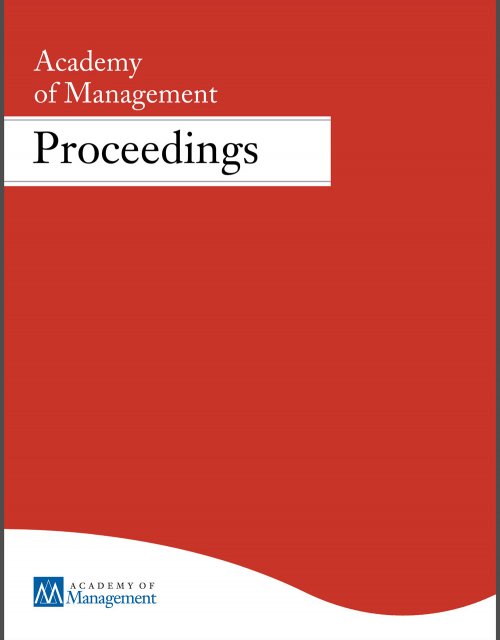Publication records
Subject(s)
Human resources management/organizational behavior; Strategy and general management
Keyword(s)
managerial and organizational cognition
Acquiring tacit knowledge is critical at work and often requires interactions, strong ties, and trust. However, it is unclear how the advent of virtual collaboration influences this process. Integrating research on virtual work, tacit knowledge, social learning, and vicarious learning, we propose that relative to face-to-face collaboration, virtual collaboration hinders the acquisition of tacit knowledge, mainly by reducing people’s observation of others’ behaviors but not the storytelling from others. We found evidence for our theory in a survey study and a critical incident study. According to the experiences from a range of professions requiring on-the-job-learning, virtual collaboration indeed hampers tacit knowledge acquisition via the reduction in observation. However, virtual collaboration is as effective as face-to-face collaboration in facilitating the acquisition of tacit knowledge via storytelling. Additionally, we find that whenever the tacit knowledge being transferred is task-based, virtual collaboration is a more effective conduit than face-to-face collaboration. When the tacit knowledge is more contextualized or embodied, such as interpersonal skills, personal development, and socialization, virtual collaboration becomes a less effective conduit than face-to-face collaboration. Our research unravels how and what people learn from others as tacit knowledge in virtual collaboration compared to face-to-face collaboration, which has important theoretical and practical implications.
With permission of the Academy of Management
Volume
2023
ISSN (Online)
2151-6561
ISSN (Print)
0065-0668
Subject(s)
Diversity and inclusion; Human resources management/organizational behavior; Strategy and general management
Keyword(s)
gender, networks, structural holes, brokerage, field experiment
A well-stablished tenet among organizational network scholars is that it is harder for women to broker structural holes because the brokerage process requires stereotypically masculine behaviors such as self-promotion, instrumental exchanges, and strategic networking. Yet, this perspective overlooks the possibility that women may become successful brokers by leveraging stereotypically female relational strategies based on interpersonal caring and warmth. Rather than defining brokerage as an inherently masculine strategy, we conducted a field experiment in which the “treatment” (a quasi-random assignment of managers to office desks) generated exogenous brokerage opportunities that are more congruent with feminine than masculine role stereotypes. The field experiment yielded three key insights. First, female managers were more effective than their male peers at forming new bridging relations. Second, these bridging relationships were based on friendship; hence, they were defined by interpersonal caring and warmth rather than by instrumental motives as is typical of masculine brokerage strategies. Third, though based on friendship, these bridging relationships yielded sizeable instrumental returns as measured by salary increases x number of months after the treatment. By highlighting the understudied role of feminine brokerage strategies, these results caution against the widespread tendency to define brokerage as inherently masculine, they advance our theoretical understanding of the relation between gender and brokerage effectiveness, and they offer practical insights on how to improve gender equality within organizations.
With permission of the Academy of Management
Volume
2023
ISSN (Online)
2151-6561
ISSN (Print)
0065-0668
Subject(s)
Economics, politics and business environment
Secondary Title
Thinking like an economist: How efficiency replaced equality in U.S. public policy
Pages
3
Journal Pages
1509 – 1511
Subject(s)
Human resources management/organizational behavior
Keyword(s)
error, error management, failure, psychological safety, organizational learning
ISSN (Print)
0015-6914
Subject(s)
Human resources management/organizational behavior
Keyword(s)
corporate culture, remote work, leadership
ISSN (Print)
0015-6914
Subject(s)
Diversity and inclusion; Human resources management/organizational behavior; Strategy and general management
Keyword(s)
CEOs, top management teams, career horizon, wages, innovation, collectivism, risk preferences, minority CEOs, cushion hypothesis, legacy
JEL Code(s)
M10, M12, M51, M52
This thesis investigates how the social embeddedness of Chief Executive Officers (CEOs) impacts their firms’ decisions.
Pages
112
Subject(s)
Human resources management/organizational behavior; Strategy and general management
Keyword(s)
office design, gender, networks, field experiment
Within organizations, women remain to this day underrepresented in leadership roles. One key explanation for this focuses on differences in the way men and women socialize at the office and build professional network. Women’s networks are less likely to afford them early access to important and diverse information that would benefit their careers. In this paper, I investigate office spatial design as a managerial lever to shape employee networks, and its differential impact on male and female employees. Further, I study gender differences in the relationship between proximity in an office space, network tie formation, and network brokerage. Seating assignments that closely match the organization’s functional groupings add spatial segregation to the pre-existing occupational segregation between men and women. I argue that breaking functional silos in seating assignments can allow women, to a larger extent than men, to diversify their ties and to access more advantageous network positions. I use data from a quasi-field experiment where the seating plan of a Mexican company’s headquarters was manipulated with the aim to decrease work-interdependence between office neighbors. Following the office reconfiguration, I find that female employees are more likely than male employees to form friendship ties with their new desk neighbors and that women’s friendship networks are more likely to become more brokerage-rich. I also find evidence that women whose networks see an increase of brokerage following the reconfiguration tend to see their wage increase.
With permission of the Academy of Management
Volume
2022
ISSN (Online)
2151-6561
ISSN (Print)
0065-0668
Subject(s)
Human resources management/organizational behavior
Keyword(s)
career regret, career decisions
JEL Code(s)
M12
Although the topic of career regrets is of interest both to research and practice, the scholarly development of this field is still rather nascent. In particular, the knowledge about the occurrence and development of career regrets remains to be limited. Drawing on the qualitative data collected through individual reflections (N=50) and semi-structured interviews (N = 22), we explore the nature of an individual’s career regrets and how a career decision becomes a regret. Our findings suggest a broader understanding of career regrets that spreads beyond regrets that are tied to occupational choices. In line with this broad understanding of career regrets, we develop a framework of a career decision becoming a career regret. Our findings also show that when people reflect on career decisions in terms of how they should have behaved differently, there are some that they perceive as career regrets while others take a form of career mistakes or career realizations. We distinguish these different ways of viewing career decisions, suggesting that the latter two kinds of decisions are more influential in shaping an individual’s future career decisions than career decisions that are career regrets. Our research has important theoretical and practical implications concerning career regrets.
With permission of the Academy of Management
Volume
2022
ISSN (Online)
2151-6561
ISSN (Print)
0065-0668
Subject(s)
Human resources management/organizational behavior
Keyword(s)
sex, network perception, recall accuracy
We seek to understand how individuals from different groups conceive, build and gain benefit from their social networks in order to be able to generate better predictions and interventions that could help more disadvantaged individuals to nurture more productive networks and extract greater gains from such networks. The projects included in the symposium tackle the idea of different network use and returns distinguishing categories of individuals along the lines of race, individual traits, and gender. The projects give insights on how actors that belong to specific social and demographic categories can use and leverage their networks to achieve positive outcomes and overcome their disadvantageous positions. Structural barriers, cognitive impediments, or beliefs about the other make minority groups unable to benefit from the networks in the same ways as the majority group. Yet, our symposium seeks to understand and propose different ways to solve the issue and create a better world in which all individuals have an equal opportunity to thrive, regardless of their group membership. With this symposium, we argue that there is a need to consider the different paths and conditions that impact individuals’ intentions to create, maintain, and utilize their network ties more closely, in order to deepen our understanding of individuals networking patterns and be able to implement effective interventions.
With permission of the Academy of Management
Volume
2022
ISSN (Online)
2151-6561
ISSN (Print)
0065-0668
Subject(s)
Human resources management/organizational behavior
Keyword(s)
turnover contagion, social influence, resource loss, network dynamics, events model
Does turnover travel through social networks and, if so, how? Extant literature suggests that turnover can spread from one departing employee to another through a social influence process. While this assumes the existence of social relations, we lack understanding of whether and how different types of relations affect the contagion process. We build on the turnover literature, which conceives social relations as resources individuals lose when their contacts leave, to distinguish between different types of social relations (instrumental, expressive, energy) and resource providers (peers, supervisors) and examine how their loss relates to turnover contagion. We draw on a unique network dataset of 1,432 employees in the Chinese subsidiary of a Dutch multinational including employees’ date of voluntary departure (271 turnover events). We estimate models inspired from the Relational Event Framework to trace the spread of departures through social ties over time and account for the effect of each departure on the networks of remaining employees. Our results are consistent with considering turnover contagion as resource loss. However, they also suggest that contagion is triggered when losing access to specific resources from particular providers. We elaborate on our results to propose a theory of network turnover contagion.
With permission of the Academy of Management
Volume
2022
ISSN (Online)
2151-6561
ISSN (Print)
0065-0668
